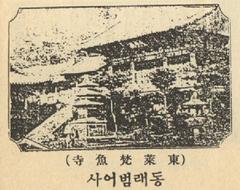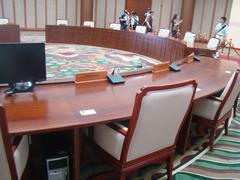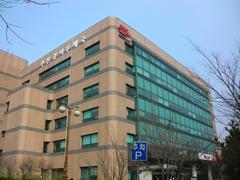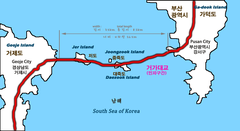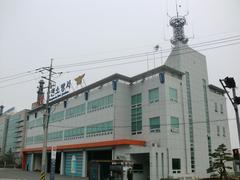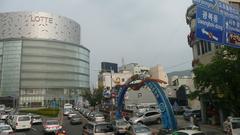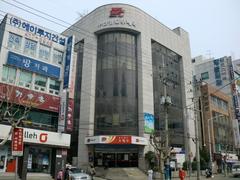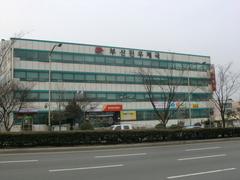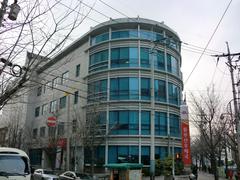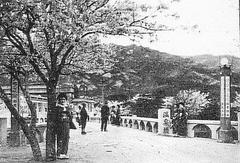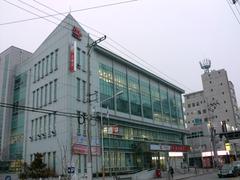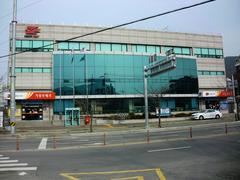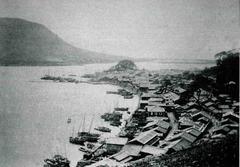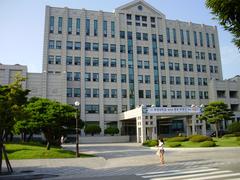Jeonpo Station Visiting Hours, Tickets, and Travel Guide: Busan Historical Sites
Date: 04/07/2025
Introduction
Jeonpo Station and the surrounding Jeonpo-dong district in Busan have risen from their industrial past to become symbols of urban renewal and contemporary culture in South Korea. This once modest neighborhood is now famous for its vibrant cafe scene, creative spaces, and dynamic community spirit. As the main access point to Jeonpo Cafe Street, Jeonpo Station is both a transit hub and a gateway to one of Busan’s most exciting and authentic urban experiences (Open Korea; Trazy Blog). This detailed guide covers the station’s history, transportation options, visiting hours, ticketing, and everything you need to explore Jeonpo-dong’s rich tapestry of history and contemporary life.
Contents
- Historical Background of Jeonpo Station and Jeonpo-dong
- Early Development and Urbanization
- Urban Regeneration and Jeonpo Cafe Street
- Cultural and Social Significance
- Jeonpo Station Overview
- Construction and Operational History
- Layout, Facilities, and Accessibility
- Operating Hours and Ticket Information
- Getting to Jeonpo Station
- Subway, Bus, Taxi, and Walking Routes
- Hop-On Hop-Off Bus Tours
- Jeonpo Cafe Street: Food, Culture, and Atmosphere
- Layout, Hours, and Accessibility
- Notable Cafes and Culinary Hotspots
- Art, Community, and Events
- Practical Tips for Visitors
- Best Visiting Times
- Transport and Navigation
- Essential Etiquette and Sustainability
- Nearby Attractions and Accommodation
- FAQ
- Summary and Final Tips
- Sources and Further Reading
Historical Background of Jeonpo Station and Jeonpo-dong
Early Development and Urbanization
Jeonpo-dong, situated in Busanjin District, was historically an industrial and residential area. Its proximity to Seomyeon, a major commercial district, made it an affordable home for workers and families during Busan’s post-war industrial boom. The neighborhood was characterized by utilitarian buildings, narrow alleys, and a strong sense of local community (Open Korea; Trazy Blog).
Urban Regeneration and Jeonpo Cafe Street
In the early 2010s, Jeonpo-dong began to transform. As Busan diversified economically, entrepreneurs and artists repurposed old factories and warehouses into trendy cafes, eateries, and shops. This process led to the emergence of Jeonpo Cafe Street, which is now a symbol of creative entrepreneurship and urban revival (Trazy Blog; A Love Letter to Asia). The district’s industrial heritage is visible in its exposed brickwork, high ceilings, and minimalist interiors, creating a unique blend of past and present (TCB Atlas).
Cultural and Social Significance
Jeonpo-dong’s renaissance reflects a wider Korean trend of transforming former industrial neighborhoods into creative hubs. The area attracts locals, digital nomads, and travelers with its artisan atmosphere, diverse dining options, and photogenic streets. Dongcheon Ginkgo Tree Street adds natural beauty, while the neighborhood’s alleyways encourage exploration (A Love Letter to Asia; TCB Atlas).
Jeonpo Station Overview
Construction and Operational History
Jeonpo Station (전포역) opened on February 29, 2008, as part of Busan Metro Line 2’s westward expansion (Wikipedia). Its introduction dramatically improved accessibility, increasing foot traffic and catalyzing the neighborhood’s revitalization. Located just a short walk from Seomyeon and Jeonpo Cafe Street, it is the main entry point for exploring the district’s cultural and culinary attractions (Trazy Blog).
Layout, Facilities, and Accessibility
Jeonpo Station features multiple exits—Exit 7 offers the shortest route (7–8 minutes’ walk) to Jeonpo Cafe Street. Facilities include elevators, escalators, tactile paving, and bilingual signage, ensuring accessibility for all travelers. The station is well-connected to local buses, and coin-operated lockers are available for luggage (A Love Letter to Asia).
Operating Hours and Ticket Information
- Operating Hours: Approximately 5:00 AM to midnight daily.
- Ticket Prices: Standard fares start at 1,300–1,400 KRW for adults, with increments based on distance. Tickets can be purchased at vending machines or with rechargeable T-money/Cashbee cards (Busan Metro Official Website).
Getting to Jeonpo Station
Subway Access
- From Busan Station (KTX/SRT):
Take Metro Line 1 northbound, transfer at Seomyeon Station to Line 2, and alight at Jeonpo Station. Total travel: 20–25 minutes (KoreaToDo). - From Gimhae International Airport:
Ride the Busan-Gimhae Light Rail Transit to Sasang, transfer to Line 2 toward Jangsan, and alight at Jeonpo. Total travel: 40–45 minutes (Korea Travel Planning). - From Haeundae Beach:
Board Line 2 at Haeundae Station, ride 17 stops to Jeonpo (about 30 minutes) (Korea Travel Planning). - Subway Fares:
1,400–1,800 KRW, payable with T-money, Cashbee, or Railplus cards.
Bus Connections
- Buses 87 and 134 serve nearby Seomyeon. Use KakaoMap for real-time info; fares match subway rates (Korea Travel Planning).
Walking from Seomyeon
- 700 meters, 10–12 minutes along Jeonpo-daero, lined with shops and street art (Agoda Travel Guide).
Taxi and Rideshare
- From Busan Station: 7,000–10,000 KRW
- From Gimhae Airport: 18,000–25,000 KRW
- From Haeundae Beach: 13,000–18,000 KRW
- Kakao T app provides English-language rides (KoreaToDo).
Hop-On Hop-Off Bus
- Stops at Seomyeon; ticket: 15,000–20,000 KRW for a one-day pass (Korea Travel Planning).
Jeonpo Cafe Street: Food, Culture, and Atmosphere
Layout, Hours, and Accessibility
Jeonpo Cafe Street is a compact, walkable district radiating from Jeonpo Station. Most cafes and restaurants operate from 10:00 AM to 10:00 PM, with some varying by day or event (Klook). Entry is free, though individual venues may have their own charges. The area is generally accessible, but some alleys may be narrow.
Notable Cafes and Culinary Hotspots
- Beheegle Bagel: Known for creative bagel sandwiches and specialty coffee (District Sixtyfive).
- Bao Haus: Taiwanese-inspired buns and street food (Klook).
- I’m Thai: Authentic Southeast Asian cuisine.
- Vintage 38: Fresh fruit parfaits and cakes.
- The JinCook: Hearty Korean fare.
- Many venues double as art galleries, enhancing the cultural vibe (Klook).
Art, Community, and Events
Jeonpo Cafe Street is a cultural enclave, with cafes hosting pop-up art exhibitions, live music, and workshops (Klook). The architecture preserves industrial facades—exposed brick, steel beams—blending heritage with modern sensibilities.
Practical Tips for Visitors
Best Visiting Times
- Weekdays, mornings: Quieter, perfect for relaxed exploration.
- Weekends/evenings: Lively, social, and ideal for people-watching (A Love Letter to Asia).
Transport and Navigation
- Use T-money/Cashbee cards for seamless transit.
- KakaoMap and Naver Map offer accurate directions (Google Maps is less reliable in Korea).
- Coin lockers available at the station.
Essential Etiquette and Sustainability
- Dispose of waste properly; minimize noise.
- Support eco-friendly cafes and use reusable cups where possible.
Nearby Attractions and Accommodation
- Busan Citizens Park: Green space for relaxation.
- Seomyeon Shopping District: Bustling area for shopping/nightlife.
- Dongcheon Ginkgo Tree Street: Scenic for walks and photography.
- Accommodation: Nearby options include Browndot Seomyeon Business, Toyoko Inn Busan Jungang Station, and local guesthouses (Klook).
Frequently Asked Questions (FAQ)
Q: What are Jeonpo Station’s operating hours?
A: Approximately 5:00 AM to midnight daily.
Q: Do I need a ticket for Jeonpo Cafe Street?
A: No, entry is free; pay only for what you order in cafes or events you attend.
Q: Is Jeonpo Station and Cafe Street accessible?
A: Yes, the station and main streets are accessible, but some alleys may be narrow.
Q: Can I join a guided tour?
A: Local operators offer walking tours—check Busan Tourism Organization for details (Busan Tourism Organization).
Q: Are there public restrooms?
A: Restrooms are available at Jeonpo Station and in many cafes.
Q: What is the best way to get real-time transit updates?
A: Use the Audiala app or local apps like KakaoMetro.
Visual Guide
Internal Links
- Explore our Complete Guide to Busan Metro Lines
- Discover Top Cafés in Busan’s Jeonpo District
- Learn about Busan Historical Sites and Cultural Attractions
Summary and Final Tips
Jeonpo Station, strategically located on Busan Metro Line 2, is your entry point to Jeonpo-dong—a thriving neighborhood where industrial heritage meets creative urban culture. With convenient operating hours, accessible facilities, and seamless transport connections, it’s easy for travelers of all backgrounds to immerse themselves in Jeonpo’s renowned cafe culture, art scene, and vibrant street life. Explore the area’s hidden corners, savor innovative food and drink, and experience a district that encapsulates Busan’s spirit of transformation and community (Trazy Blog; Klook; Busan Metro Official Website; Korea Travel Planning).
For the best experience, plan your visit using real-time transit apps, arrive early to avoid crowds, and take time to explore both the main streets and quieter alleys. Download the Audiala app for personalized guides and stay updated on local events.
Sources and Further Reading
- This is a sample text. (Open Korea)
- This is a sample text. (Trazy Blog)
- This is a sample text. (A Love Letter to Asia)
- This is a sample text. (TCB Atlas)
- This is a sample text. (Wikipedia)
- This is a sample text. (Our Travel Itinerary)
- This is a sample text. (Busan Metro Official Website)
- This is a sample text. (Busan Tourism Organization)
- This is a sample text. (District Sixtyfive)
- This is a sample text. (Klook)
- This is a sample text. (Korea Travel Planning)
- This is a sample text. (KoreaToDo)
